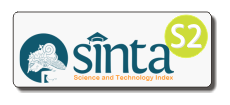The manifestations of digital literacy in social media among Indonesian youth
Abstract
Digital literacy capability is a must in the era of internet access, especially in the use of social media. All internet users, especially university students, must practice digital literacy. This study aims to found the common forms of university students' digital literacy behavior when using social media. This study uses a mixed-method approach as it consists of data search using a digital literacy scale, an open-ended questionnaire, and interviews with university students in Yogyakarta. The results of this study indicate that respondents with high digital literacy levels conduct a process of evaluating truthful information by checking trusted sources of information directly and discussing their findings with significant others. The likelihood and ability to evaluate information correctly is affected by family background, formal education, and negative hoax impact awareness. The study also found that after respondents perform across (double) checks, they will usually forward the information, also known as doing a repost. This research implies a description of digital literacy behavior carried out by students in Yogyakarta; with this study, digital literacy behavior expects to provide an overview of information technology policymakers.
Keywords
Full Text:
PDFReferences
Asosiasi Jasa Penyedia Internet Indonesia (APJII). (2016). Infografis Penetrasi dan Perilaku Pengguna Internet Indonesia (Infographic on Indonesian internet user penetration and behavior). Retrieved from https://apjii.or.id/downfile/file/surveipenetrasiinternet2016.pdf
Asosiasi Jasa Penyedia Internet Indonesia (APJII). (2018). Infografis Penetrasi dan Perilaku Pengguna Internet Indonesia (Infographic on Indonesian internet user penetration and behavior). Retrieved from https://www.apjii.or.id/content/read/39/410/Hasil-Survei-Penetrasi-dan-Perilaku-Pengguna-Internet-Indonesia-2018
Bawden, D. (2008). Origins and concepts of digital literacy in Digital literacies: Concepts, policies and practices. In C. Lankshear. & M. Knobel (Eds). Digital literacies: Concepts, policies and practices. Peter Lang Publishing, Inc.
Chaiken, S., & Ledgerwood, A. (2012). A theory of heuristic and systematic information processing. In P. A. M. Van Lange, A. W. Kruglanski, & E. T. Higgins (Eds). Handbook of theories of social psychology. Volume 1. SAGE Publications Ltd. https://psycnet.apa.org/doi/10.4135/9781446249215.n13
Chen, C., Chang, S., & Liu, C. (2012). Understanding knowledge-sharing motivation, incentive mechanisms, and satisfaction in virtual communities. Social Behavior and Personality, 40(4), 639-648. https://doi.org/10.2224/sbp.2012.40.4.639
CIGI-IpSos. (2017). Global survey on internet security & trust. Retrieved from https://www.cigionline.org/internet-survey-2017
Cresswell, J. (2009). Research design: Qualitative, quantitatice and mixed-method approaches. Third edition. SAGE Publications.
Dong, M., & Deng, D. (2016). Effect of interns' learning willingness on mentors' knowledge sharing behavior. Social Behavior and Personality: An International Journal, 44(2), 221-232. https://doi.org/10.2224/sbp/2016.44.2.221
Eshet-Alkalai, Y. (2004). Digital literacy: A conceptual framework for survival skills in the digital era. Journal of Educational Multimedia and Hypermedia, 13(1), 93-106.
Hair, Jr., J., F. Black, W., C. Babin, B., J. & Anderson, R., E. (2010). Multivariate data analysis, 7th edition. Pearson.
Helmi, A. F. (2010). Determinant perilaku inovatif (Determinant of innovative behavior). (PhD thesis). Universitas Gadjah Mada, Yogyakarta.
Kominfo. (2014). Riset Kominfo dan Unicef mengenai perilaku anak dan remaja dalam menggunakan internet (Kominfo and Unicef research on the behavior of children and adolescent in using the internet). Retrieved from https://kominfo.go.id/index.php/content/detail/3834/Siaran+Pers+No.+17-PIH
Krippendorff, K. (2004). Content nalysis: Introduction to its methodology. SAGE Publications Inc.
Lankshear, C., & Knobel, M. (2008). Digital literacies: Concepts, policies and practices. Peter Lang Publishing, Inc.
Martin, A. (2005). A European framework for digital literacy: A progress report. Journal of ELiteracy, 2, 130-136.
Ng, W. (2012). "Can we teach digital natives digital literacy?" Computers & Education, 59(3), 1065-1078. https://doi.org/10.1016/j.compedu.2012.04.016
Pietrass, M. (2007). Digital literacy research from an international and comparative point of view. Research in Comparative and International Education, 2(1), 1-12. https://doi.org/10.2304%2Frcie.2007.2.1.1
Pratolo, B. W., & Solikhati, H. A. (2020). The implementation of digital literacy in Indonesia suburban EFL classes. International Journal of Scientific & Technology Research, 9(1), 1508-1512.
Priwati, A. R. (2018). Cross (double) check dan repost: Manifestasi literasi digital di media social (Cross (double) check: Digital literacy manifestation in social media). (Master thesis). Universitas Gadjah Mada, Yogyakarta.
Rahmah, A. (2015). Digital literacy learning system for Indonesian citizen. Procedia Computer Science, 72, 94-101. https://doi.org/10.1016/j.procs.2015.12.109
Ramdhani, N., Wiradhany, W., & Rachmayani, D. (2013). Pengembangan alat ukur literasi digital (Development of digital literacy measurement). Temu Ilmiah Nasional 3. Jakarta: Universitas Tarumanagara.
Sharma, R., Fantin, A., Prabhu, N., Guan, C., & Dattakumar, A. (2016). Digital literacy and knowledge societies: A grounded theory investigation of sustainable development. Telecommunications Policy, 40(7), 628-643. https://doi.org/10.1016/j.telpol.2016.05.003
Suwana, F., & Lily. (2017). Empowering Indonesian women through building digital media literacy. Kasetsart Journal of Social Sciences, 38(3), 212-217. https://doi.org/10.1016/j.kjss.2016.10.004
Tapscott, D. (2009). Grown up digital: How the next generation is changing your world. McGraw-Hill.
Van Deursen, A. J. A. M., & Van Dijk, J. A. G. M. (2009). Using the internet: Skill related problems in users' online behavior. Interacting with Computers, 21(5-6), 393-402. https://doi.org/10.1016/j.intcom.2009.06.005
Walther, J. B. (2011). Theories of computer-mediated communication and interpersonal relations. In M. L. Knapp & J. A. Daly (Eds). The Handbook of Interpersonal Communication. SAGE Publications Ltd.
Wanandhi, R. S. (2016). Literasi digital dan kontrol diri sebagai prediktor terhadap internet addiction pada mahasiswa (Digital literacy and self-control as predictors of internet addiction among undergraduate students). (Undergraduate thesis). Universitas Gadjah Mada, Yogyakarta.
Warschauer, M. (2009). Digital literacy studies: Progress and prospects. In M. Baynham & M. Prinsloo (Eds). The future of literacy studies. Palgrave Macmillan.
Wood, J. T. (2009). Communication in our lives. Fifth edition. Wadsworth Cengage Learning.
DOI: http://dx.doi.org/10.26555/humanitas.v18i1.17337
Refbacks
- There are currently no refbacks.
HUMANITAS: Indonesian Psychological Journal
ISSN 1693-7236 (print), 2598-6368 (online)
Email : humanitas@psy.uad.ac.id

This work is licensed under a Creative Commons Attribution-ShareAlike 4.0 International License.












